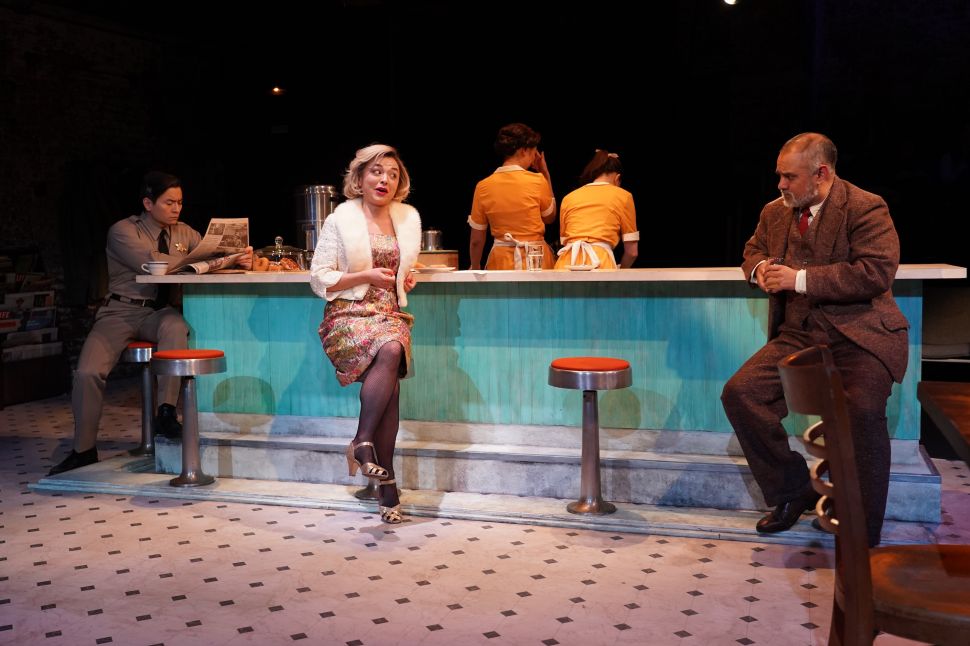William Inge’s Bus Stop may be 70 years old, but its lovelorn and lusting characters invite present-day descriptors: gathered at a Kansas diner during a blizzard we encounter a sex pest and stalker, fuck buddies, a groomer, and possibly a closet case. (That last expression dates back to the 1940s.) Forgive my coarse slang; Inge’s assorted thirsters are much more polite—that is, repressed—about their hangups or vices. But however you classify these folks, a mostly outstanding cast brings them vibrantly to life in a respectful revival co-produced by Classic Stage Company, NAATCO, and Transport Group.
If Inge’s language avoids vulgarity, he doesn’t hide his core subject: the myriad agonies that come with love and sex. Let us refer to the aforementioned labels and map them. Impetuous young cowboy Bo (Michael Hsu Rosen) lost his virginity to nightclub singer Cherie (Midori Francis), subsequently forced her on a bus and has been harassing her for more physical affection. As for NSA hookups, that’s bus driver Carl (David Shih) and salty, wisecracking waitress Grace (Cindy Cheung). The predator in question is Dr. Lyman (Rajesh Bose), an alcoholic ex-teacher who makes Shakespearean-scented overtures to Elma (Delphi Borich), a pretty waitress still in high school. Less explicitly defined is Virgil (Moses Villarama), Bo’s strong-but-silent buddy. Virgil may not be out, but the ranch hand’s giving Brokeback Mountain. Not getting mixed up in any hanky-panky is square but decent sheriff Will (David Lee Huynh), whose job is to keep these horny Kansans from running amok.
Snowed in and waiting for a crew to clear the highway, Carl and his passengers pass the hours with their relationship dramas that simmer, explode, or overlap with others. Dr. Lyman spikes his lemon soda with whiskey while flirting with the oblivious and impressionable Elma. Carl and Grace contrive to meet in Grace’s adjoining apartment for a quickie. Cherie, suitcase stashed behind the counter, prays the bus will leave soon—without her aboard. The girl has essentially been kidnapped by Bo, determined to ferry her to a “God-forsaken ranch in Montana,” as she puts it. Prone to tantrums, the bullying Bo is kept barely in check by Virgil, his much more mature and level-headed friend. The tension of Bus Stop lies mainly in finding out if Inge will steer his group portrait toward tragedy or comedy. Will Bo and Cherie fight their way to true love? Will Dr. Lyman lure Elma into a tryst in Topeka?
Frequently compared to his coeval Tennessee Williams—both premiered work on Broadway through the 1950s and ’60s—Inge (1913–1973) is widely regarded as the lesser writer. Certainly, his language lacks Williams’s flamboyant lyricism and his sexual frankness comes across as paler, primmer. When it opened on Broadway at the Music Box Theatre, Bus Stop’s neighbor down 45th Street was the comparatively pornographic Cat on a Hot Tin Roof at the Morosco. Both are stellar examples of midcentury American drama, but it’s the Williams that has gotten five revivals to Inge’s one (in 1996). Today, Inge remains the yellow-bellied western meadowlark to Williams’s pink flamingo. Even so, director Jack Cummings III’s scrupulously detailed, slow-burning production makes a sturdy case for revisiting Grace’s diner, especially in the close environs of Classic Stage Company.
Cummings’s strongest asset is a hugely appealing ensemble. Coinciding with Asian American and Pacific Islander Heritage Month, the production casts AAPI actors in roles they fit beautifully. With her blend of deadpan wit and world-weary grit, Cheung leaves nary a crumb as Grace, dispensing side-eye and side-of-mouth punch lines. Balancing Cheung’s one-liners, the sweet Borich infuses ingenue Elma with curiosity and kindness. Shih’s working-joe bus driver is a rumpled hoot and Huynh’s cop a beacon of dignity and tolerance. In a role that Marilyn Monroe hoped would prove her acting bona fides, Francis sports blonde highlights and adopts a Southern drawl to charming effect. Cherie is neither victim nor innocent, and the gifted Francis finds the right proportion of kittenish alarm to hellcat fury.
Two of the more difficult (and dated) roles yield mixed results. Rosen’s recently deflowered cowpoke is a baby-man with a temper, and for the first half Rosen seems more like a rodeo fop than a real fella. But his Bo grows on you, acquiring layers of pain and emotional intelligence before your eyes. A great character actor could, hypothetically, dominate the show with Lyman, the most articulate and tragic of these pilgrims, a boozer and sex predator who has enough morals left to know he’s a monster. Bose could have made a meal of this roguish windbag, but I’m sorry to report he barely gets past the bread roll and salad.
Happily, Villarama’s Virgil is a memorable study in less-is-more. The brooding, guitar-strumming performer (whose role as the DJ in Here Lies Love was electric) becomes the surprise last man standing in Inge’s story, and his melancholy final moments as Grace closes her eatery linger in one’s memory. May an inspired writer pen a sequel to Bus Stop focused entirely on Virgil’s progress. And not without Villarama.
Truth is, casting is the only way in which this version is nontraditional. The design (sets by Peiyi Wong, costumes by Mariko Ohigashi) stays dutifully in period. Cummings directs by the book, but the pacing and entrances slightly lag. One needn’t go all Ivo van Hove—no one’s asking for live video or nudity and anachronistic pop tunes—but bolder mise en scène could unlock hidden energies. Inge’s repeated plaints on intimacy need a heavier foot on the gas so they don’t cloy the palate. Grace puts it succinctly early on: “Makin’ love is one thing, and being lonesome is another.” She plates the truth, and serves it up fast and hot.
Bus Stop | 2hrs 10mins. One intermission. | Classic Stage Company | 136 East 13th Street | boxoffice@classicstage.org | Buy Tickets Here

